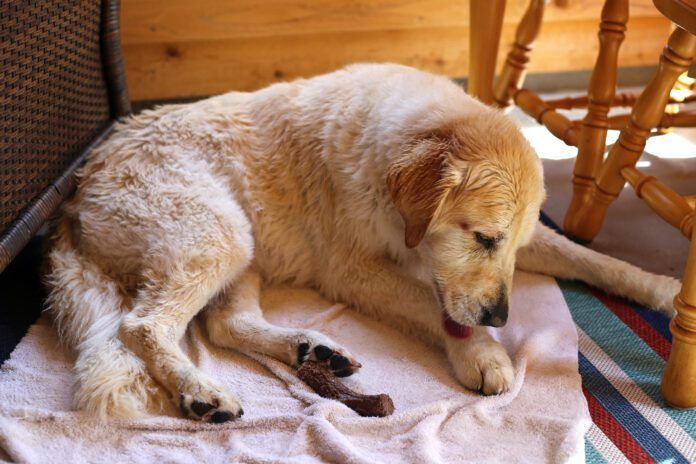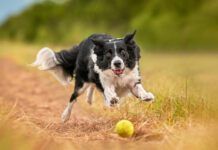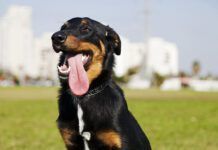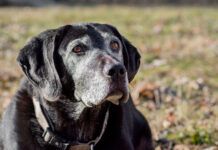Hot spots, also known as acute moist dermatitis, are a common, painful skin condition in dogs. These raw, inflamed, and sometimes oozing lesions can appear suddenly and worsen quickly if left untreated.
Hot spots are typically the result of an underlying issue that leads a dog to excessively lick, scratch, or chew a particular area, causing irritation and infection. Understanding the causes, treatment options, and preventative measures can help you effectively manage and prevent future hot spots for your dog.
Hot Spots Are Infections
Hot spots are localized areas of inflammation and infection of the skin. They usually present as red, moist, irritated patches that can be painful and prone to rapid enlargement. The affected area may have missing fur, a sticky or crusty texture, and an unpleasant odor due to bacterial infection.
Hot spots develop when a dog persistently licks, chews, or scratches a particular area, causing skin damage and allowing bacteria to thrive. Several underlying factors that can trigger this excessive self-grooming behavior include allergies, external parasites, skin infections, trapped moisture, and underlying pain or stress.
Causes of Hot Spots on Dogs
Hot spots can occur anywhere on a dog’s body, but they commonly occur on the limbs, head, neck, and hips. Causes include:
- Environmental allergies. Pollen, dust mites, and mold can trigger an allergic reaction in dogs, causing itchy skin.
- Food allergies. Dogs who are sensitive to certain ingredients in their food or treats can lead to inflammation, which then causes excessive scratching, licking and chewing.
- Flea-allergy dermatitis occurs in dogs who have a reaction to flea saliva. These dogs can develop intense itching from even a single flea bite, leading to hot spots. Fleas themselves can also cause itching, as can skin mites and ticks. Staying on top of monthly parasite prevention can help minimize the risk of your pet getting fleas or ticks.
- Bacterial or fungal skin infections. Skin infections can cause localized irritation that prompts dogs to lick and chew the area, worsening the condition. These infections can be caused by multiple factors, but trapped moisture from swimming, bathing, or humid weather can create a warm, damp environment that is perfect for bacterial and fungal growth.
- Matted fur. Tangles of matted fur prevent air circulation and trap dirt and moisture to the skin. Really bad mats can pull on the skin, which leads to sores. Breeds with long hair and breeds with skinfolds should be monitored closely for these infections and kept as dry as possible.
- Joint pain or arthritis may cause dogs to lick certain areas as a form of self-soothing.
- Stress, boredom, or anxiety can also lead to excessive licking as a coping mechanism.
Treating a Hot Spot on a Dog
Once a hot spot appears, prompt treatment is essential to prevent it from worsening. Follow these steps to treat a hot spot:
- Carefully trim the fur from around the affected area to allow for better air circulation. It also makes it easier to clean and treat the wound.
- Gently cleanse the area with a mild antiseptic solution such as diluted chlorhexidine or betadine. Avoid using hydrogen peroxide as it can damage healthy cells and slow the healing process.
- After cleaning, gently pat the area dry with a clean towel. Keeping the spot dry is crucial for healing.
- Consider a topical treatment. A veterinary topical spray, ointment, or medicated cream that contains antibacterial, antifungal, and anti-inflammatory properties. Some commonly used treatments include hydrocortisone creams to help reduce itching and irritation and antibiotic ointments to prevent bacterial infections.
Once the spot has been treated, keeping your dog from further licking and scratching is key. Elizabethan collars (E-collars) or inflatable collars can prevent dogs from licking and worsening the wound.
If an underlying allergy or irritation is causing excessive scratching, talk to your vet about antihistamines, allergy medications, hypoallergenic diets, or flea treatments. If the hot spot worsens, spreads, or does not improve within a few days, consult your veterinarian. In severe cases, oral antibiotics, anti-inflammatory medications, or prescription-strength topical treatments may be necessary.
Preventing Canine Hot Spots
Preventing hot spots is possible with good hygiene, parasite control, and addressing any underlying issues. Regular grooming through brushing and bathing can remove loose fur and dirt and can prevent mats from forming in the coat.
Be sure to keep your dog as dry as possible, drying them thoroughly after swimming or bathing. A high velocity dryer or hair dryer can be helpful to reach the skin and drive off moisture that a towel cannot.
If your dog suffers from seasonal allergies, consult your vet about allergy medications or specialty diets. You can also supplement your pet’s diet with omega-3 fatty acids to support skin health.
If your pet is licking or chewing due to joint pain, work with your vet to find ways to manage and reduce pain to keep your companion comfortable.
Chew toys, food puzzles, walks, training, and interactive play can all help to manage boredom and stress-induced licking. For anxious dogs, work with your vet to find calming aids or medications to manage anxiety and reduce undesirable stress behaviors.
Hot spots can be frustrating to manage, but with early intervention and proper care, they can be effectively treated and prevented. By identifying the underlying causes, keeping your dog’s skin healthy, and addressing excessive licking and scratching behaviors, you can help your pet stay comfortable and free from recurring hot spots. If in doubt, or if things worsen, consult your veterinarian to ensure the best course of action for your furry friend.






